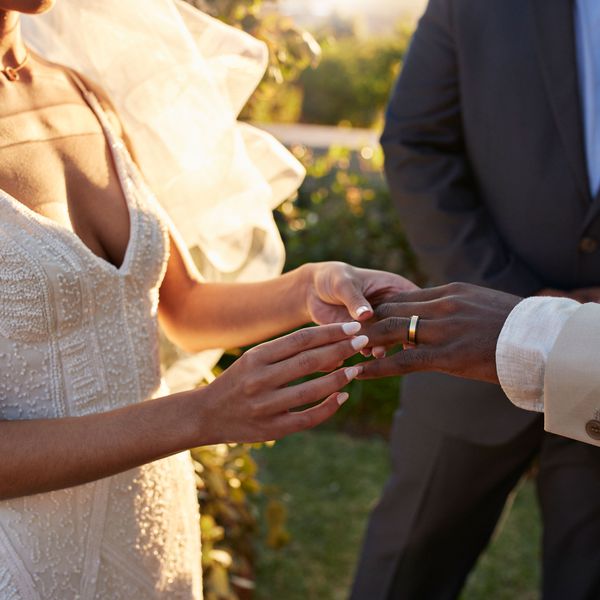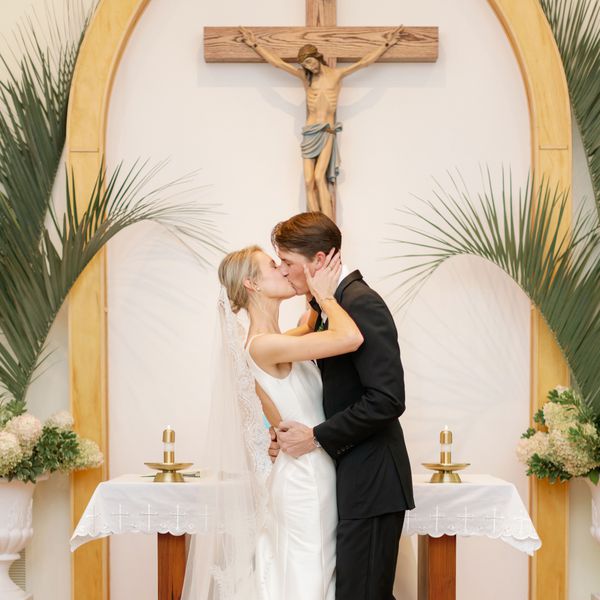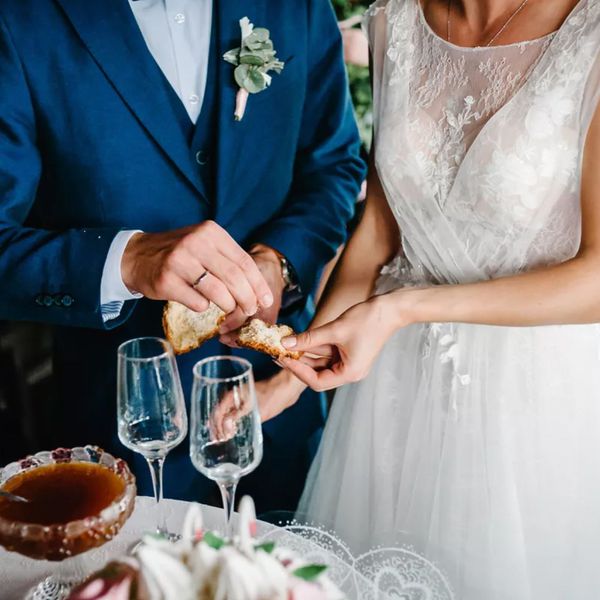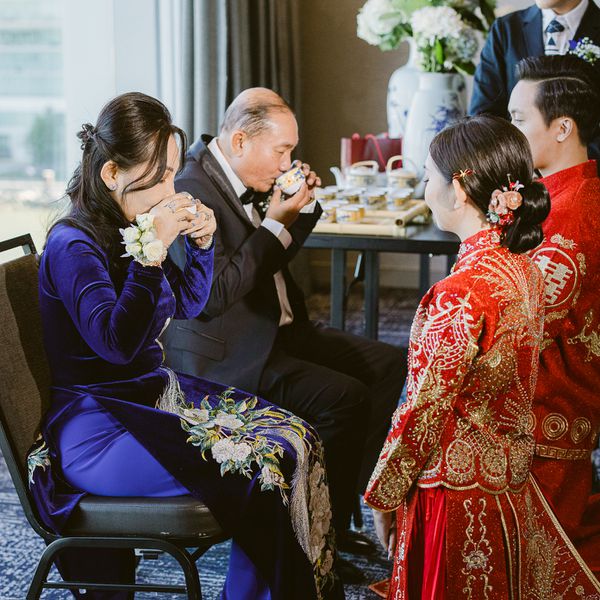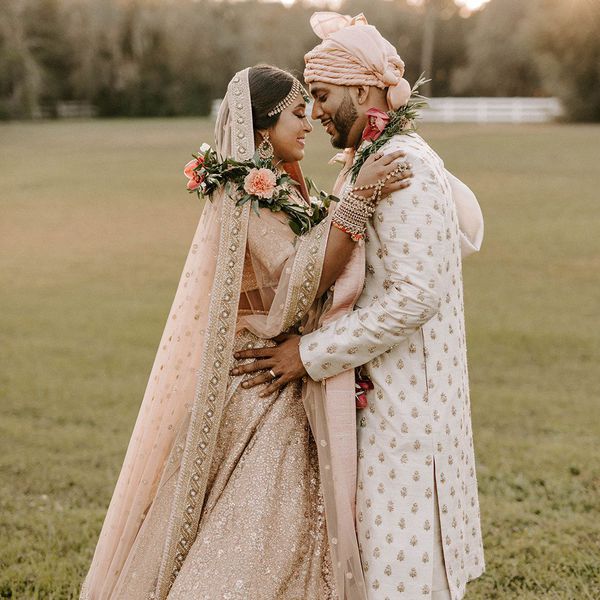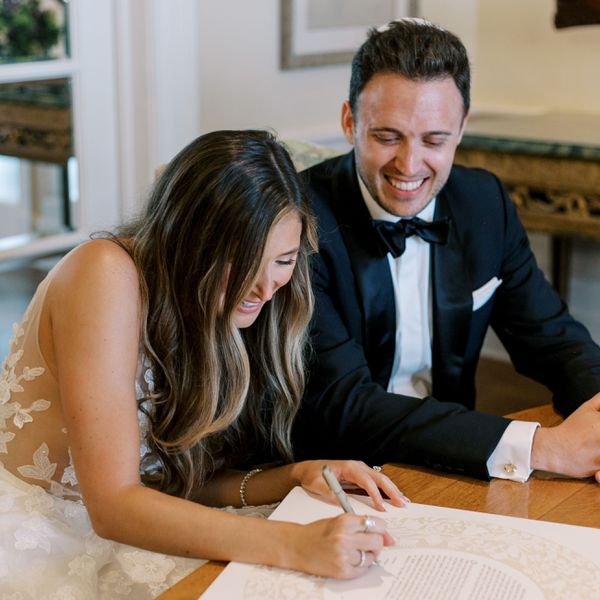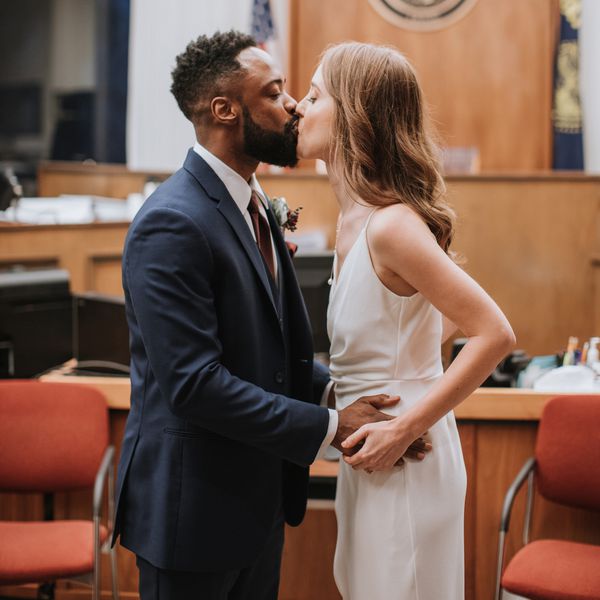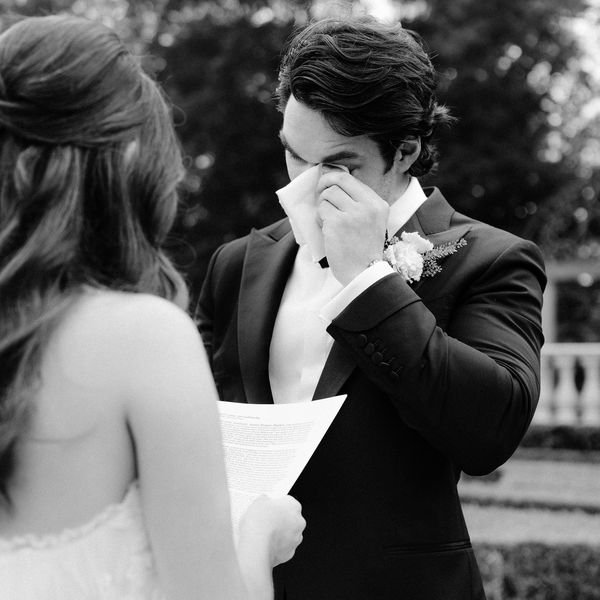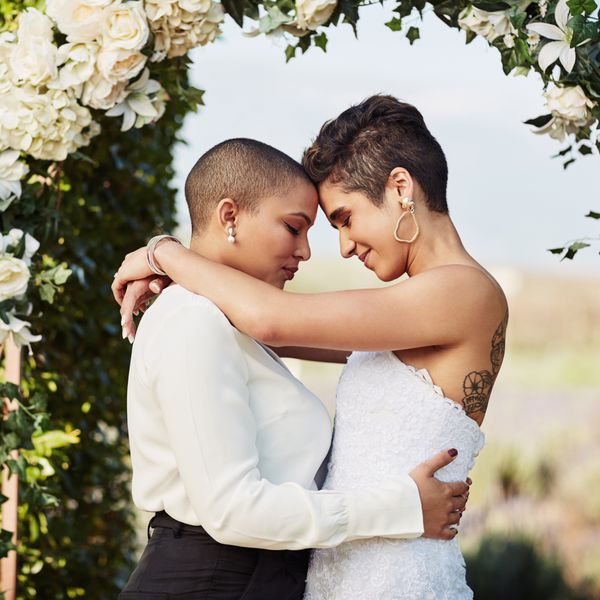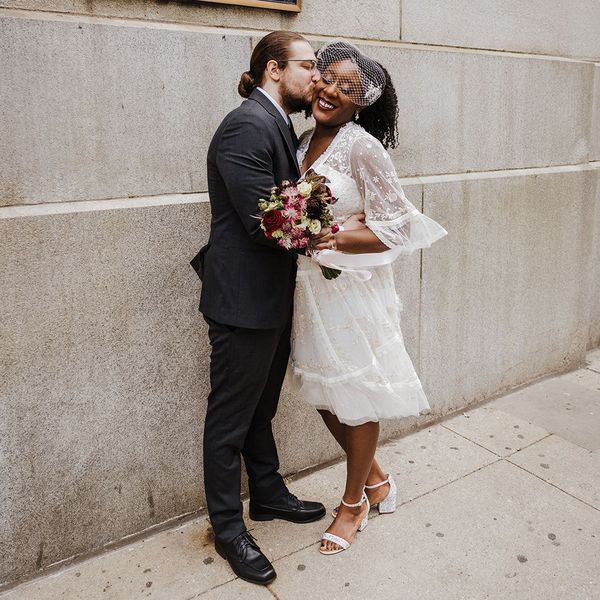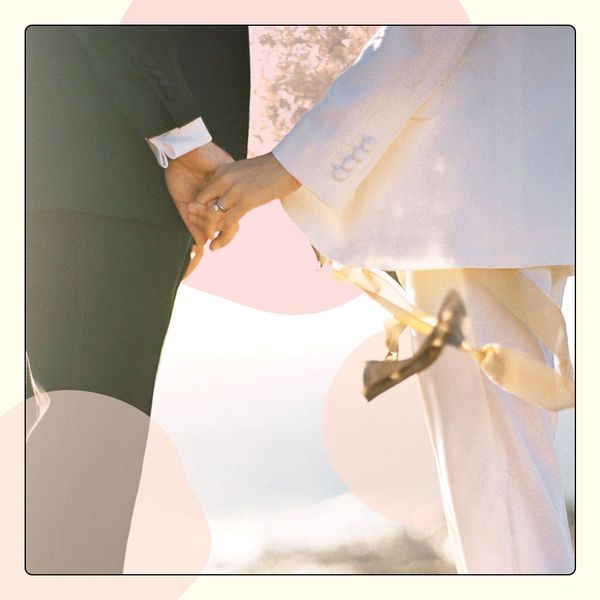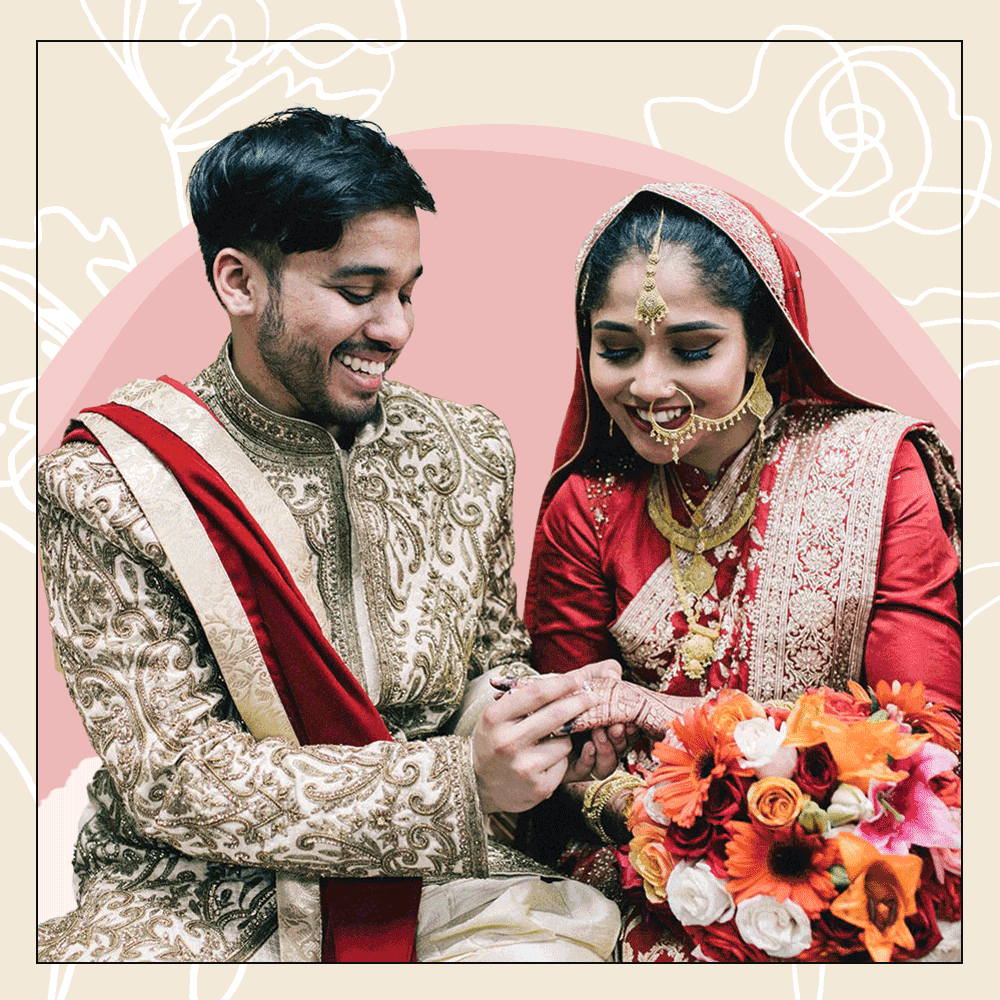
PHOTO BY TOWARDS THE MOON / Design by Zackary Angeline
If you’re a Muslim who’s recently engaged and in the process of planning a Nikah (also spelled "Nikkah") wedding ceremony, you're probably well aware that this celebratory event is highly regarded within the Islamic faith. For the 1.9 billion Muslims around the world, despite your religious sect, culture, or family, the fundamentals are the same: During this short-and-sweet service, you and your partner will officially accept your committed partnership, sign a marriage contract in front of an imam (a Muslim cleric) and at least two witnesses, and receive a blessing. Holding this ceremony is an opportunity to legitimize your marriage under Islamic law and for you and your partner to celebrate the values of a Muslim marriage, recall your duties as spouses, and be reminded of your eternal commitment to one another.
Meet the Expert
Imam Steve Mustafa Elturk is the president of the Islamic Organization of North America (IONA) in Warren, Michigan. He has officiated hundreds of Nikahs for Muslim couples and is very active in the Muslim community.
While the principles are consistent, some of the details of the Nikah have evolved over time. For instance, this religious ceremony traditionally takes place in a mosque, with the leader or imam of the mosque officiating the ceremony, but today, it's common for the Nikah to occur at the bride's home or another venue, such as a hotel. The look of the service has also changed, too. Although the ceremony is supposed to be simple to avoid placing a financial burden on the couple, as some couples mix Islamic and Western traditions, the event has become more glamorous for some.
If you're going to embrace the Nikah at your celebration, we spoke with Imam Steve Mustafa Elturk, president of the Islamic Organization of North America (IONA) in Warren, Michigan, on the fundamentals you need to know. Read on for a full guide to planning and preparing for this religious wedding ceremony.
The Purpose of a Nikah Wedding Ceremony
The Nikah is a religious ceremony for Muslim couples, where they legally wed under Islamic law. It’s a Prophetic tradition and the only acceptable way that a couple can be married. Since two partners cannot be intimate unless the Nikah has taken place, the ceremony legitimizes the relationship in the eyes of God. “Marriage in Islam is a blessing and it is considered a very important part of faith," Imam Elturk notes.
Nikah Wedding Ceremony Requirements
There are a handful of requirements that the couple needs to meet in order for the Nikah wedding ceremony to take place, which Imam Elturk outlines below.
The Proposal
Like any other religious tradition, a marriage proposal kicks off the Nikah process. In many cultures, it's common for a man to pop the question, but in Islam, women often propose, “as was the case with Khadijah, the first wife of the Prophet, peace, and blessings upon him,” Imam Elturk says. As long as the intention of the proposal is to get married, either partner can ask for the other's hand in marriage.
The Quobool
The Qubool is the acceptance of the proposal. It's important to note that both parties must mutually agree to go through with the wedding, a decision that doesn't have to be (and often isn't) immediate. After one partner proposes, the couple usually meets as many times as they'd like (as long as the meeting is in a public place with a chaperone), so they can gauge their compatibility.
The Mahr
The Mahr is an obligatory gift from the groom to the bride that symbolizes the man's responsibility to provide for and take care of his wife. This gift is typically a lump sum of money, an amount that the bride chooses, but she can also ask for a vacation, an education, or anything else that she wishes (within the means of her future husband, of course). Although the bride often selects the present, her family can also file the request. The groom can either give the Mahr to the bride during the Nikah or at another point in the future.
Before the Nikah, discuss expectations for the Mahr with your future spouse. Since the bride's family has some say in the size of the gift, seek input from them, too. Whatever you decide, make sure the two of you are on board with it.
The Wali
The Wali, or the father of the bride, “gives away” his daughter during the Nikah ceremony. Before performing his duty, though, the bride's father first needs to get permission from his daughter. If the father of the bride is deceased or if he cannot walk her down the aisle for any other reason, then another male guardian or relative, usually her grandfather, older brother, or uncle, will need to take on this role. For Nikahs at a mosque, some ask the bride to be accompanied by her father, plus another family member.
The Witnesses
In order for the couple's marriage to be recognized by God, there needs to be a minimum of two male Muslim witnesses (or one man and two women at some venues) present during the Nikah. These bystanders must be able to attest to the fact that both partners said "Quobool," or "I do," by their own free will—without any pressure from family members, friends, or others. The Wali is usually prohibited from serving as a witness, and at some mosques, the witnesses must know both the bride and groom personally.
The Officiant
Like any other wedding ceremony, an officiant will conduct the service. For a Nikah, the imam of a local mosque is usually the one who presides over the ceremony, but any devout Muslim can do the honors. Usually, this person is a male, but in some communities that are more progressive, a female officiant can also step up to the plate.
The Marriage Contract
Signing the marriage contract is one of the most important parts of the Nikah, so you'll need to have the document on hand during the ceremony. Your officiant will probably have sample contracts that you can adapt, but you can also draft up your own. Whatever route you choose, you and your partner will need to jot down promises—no matter how vague or specific—that you intend to maintain throughout your marriage.
The Marriage License
If you're having your Nikah at a local mosque, you'll likely need to acquire and complete your marriage license ahead of the ceremony. For those who are holding their service in an Islamic country, your imam will register your marriage with the government following the service.
:max_bytes(150000):strip_icc()/nikah-wedding-getty-images-08308e0e82d14cf2895235cf3da993c3.jpg)
Nanang Sholahudin / Getty Images
What Happens at a Nikah Wedding Ceremony
Once you've met all of the requirements, you're eligible to throw a Nikah. Below, we discuss the standard order of the event.
The Arrival
While Nikahs set at a mosque enforce segregation, no matter where you're hosting your wedding ceremony, it's customary that you and your future spouse refrain from seeing one another on that day until the service begins. Escorts will likely usher both of you to the stage separately, too.
The Sermon
As you and your future spouse are perched on the stage—often with a curtain separating the two of you—the imam will recite prayers and readings from the Koran before giving a short sermon about the importance of marriage, according to Imam Elturk. If your officiant is another Muslim who isn't affiliated with the mosque, though, this portion of the Nikah won't include a sermon—just prayers and readings.
The Acceptance
Next, you and your partner will verbally accept the marriage, a formality that depends on your culture. In some cases, the bride will vocalize that she gives herself away (or the imam utters the words), and the groom will accept. Other times, the imam will ask the couple questions, and both the bride and groom will say, "I accept."
The Signing of the Contract
The focal point of the Nikah? When you, your significant other, and your witnesses sign the marriage contract, legalizing your marriage under civil and religious law. The document will likely be presented on an elaborate table, so you and your bystanders can add your signatures. For the sake of time, your imam may prefer that you write your names ahead of the service.
The Blessing
To conclude the Nikah, the officiant will bless you and your spouse. The blessing usually lasts only a minute or two, but it's a touching way to begin your newlywed lives. Then, the officiant will present the two of you as a betrothed couple.
How to Plan a Nikah Wedding Ceremony
Once you and your partner agree to get married and once you have all of the requirements in place, you can start planning your Nikah, a process that's similar to that of other wedding events. Read on for a list of tips to follow as you begin orchestrating this religious event.
Select a Time and Place
One of the first steps entails choosing your wedding date and venue. If you're hosting your Nikah at a mosque, run a date and time by the imam. If you're thinking about holding the service at another venue, your designated day will depend on the locale's availability. For an at-home venue, of course, you'll have more flexibility with the time you choose.
Gather Witnesses
While preparing, you'll also need to ask two male Muslims to be your witnesses. Some mosques require that you and your partner both know the witnesses, but regardless of the venue, most couples choose relatives—one from the bride’s side and one from the groom’s side.
Coordinate With Your Officiant
Whether you're enlisting an imam or another officiant, you'll need to discuss how you intend to proceed with the marriage contract. If an imam will preside over your Nikah, confirm if they'll bring the document or if you'll supply the promises. For ceremonies that are taking place at another venue, not a mosque, double-check that your imam will be present.
Choose the Décor
If you're hosting your Nikah at home, you have more leeway with the décor. Nowadays, Nikahs are heavily influenced by the all-white wedding of the West, so couples will often use whites, creams, and gold for their color palettes.
Decide on the Seating
For your seating arrangements, many couples prefer that their guests sit front-facing, so they can see their loved ones throughout the Nikah. At a mosque, the group will often assemble in front of the main hall.
Establish the Dress Code
Dress codes for Nikahs are typically modest, especially if the ceremony is taking place at a mosque. Generally, guests will wear brightly-colored attire that fully covers their arms and legs, and women will bring a scarf to wrap around their heads. For Nikahs at a mosque, guests will need to remove their shoes before entering, so encourage your invitees to sport a pair that's easy to slip on and off.
Celebrate With a Banquet
After the Nikah ceremony (either following the ceremony or days later), many couples celebrate with a banquet, a gathering of their loved ones. While Islamic principles discourage exorbitant purchases and lavish displays of wealth, the size, scale, and look of these functions really depend on your culture and financial status. At these post-ceremony events, the type of food that you serve may vary, depending on your culture and family.


